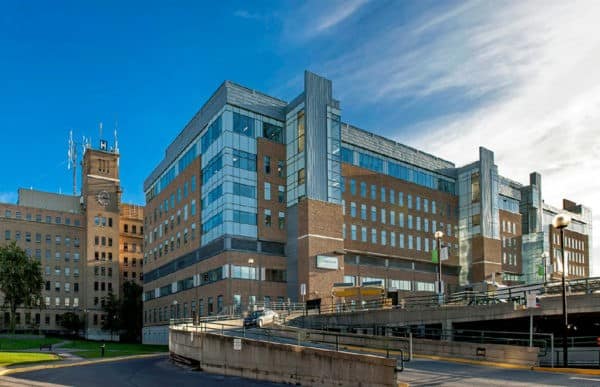
 Is Canada becoming a medical tourism destination?
Is Canada becoming a medical tourism destination?
A new report on the international trade in medical tourism says that governments around the world are ramping up their efforts to lure in wealthy foreigners for medical treatment. And that includes medical tourism in Canada, where the practice is seen as a lucrative revenue source for hospitals.
Health care is, of course, a topic of constant debate and consternation for Canadians, with one issue guaranteed to raise emotional temperatures all around: Canadian citizens going abroad to seek medical treatment.
Every year, the conservative think tank, the Fraser Institute, releases its report tallying the number of Canadians travelling to other countries for medical care, its latest findings showing that 63,459 citizens did so in 2016. That figure, based on physician estimations about their own patients, was up from 45,619 in 2015 and 52,513 in 2014.
“More and more Canadians clearly feel they must leave the country to get the medical care they need,” said Yanick Labrie, Fraser Institute senior fellow and co-author of the report, in a press release.

Long wait times for procedures in Canada is one of the most oft-cited explanations for the trend, a feature which, according to critics of Canadian medicare, is an indication of deep-seated problems in Canada’s public health care system. That premise even got raised in last year’s US presidential race, when Donald Trump opined that Canadians leaving their country to seek medical treatment was a sign of dysfunction in Canada’s approach to medicare.
Canadians leave but Canada is a medical tourism destination as well…
But Canadian medical tourism occurs in the opposite direction, too, with some hospitals vying on the international market to attract foreigners who will pay big money for procedures. Indeed, around the world, the globalization of health care has been growing as a result of trade agreements which allow for the offshoring of medical-related services. This is according to a recent report on medical tourism produced by members of the Global Healthcare Policy and Management Forum, which met last year to discuss the impact of medical tourism and the role played by state actors therein.
A report on Toronto’s University Health Network found that between 2011 and 2015, the UHN had treated 621 foreign patients, the majority of whom were seeking cancer or cardiac treatment, with revenue totalling almost $30 million.
“Medical tourism has been taken up by governments as an economic growth engine,” say the report’s authors, “with potential for generating and diversifying employment opportunities in struggling regional economies, boosting demand for locally-produced medical equipment and attracting biotechnology research and development.”
The authors raise a number of concerns, saying that more study is needed on the growing phenomenon to assess its economic and social impacts. One scenario that may be transpiring, they write, is that patients from industrialized countries like Canada who head to developing parts of the world (Central America and the Caribbean, for example) may be contributing to health inequalities in those countries.
“Scarce data is available on the indirect economic impacts of this practice,” say the authors, “though its most significant economic benefits may well be for non-medical sectors.”
The report notes that some countries are more involved in the industry than others. South Korea, for example, has identified medical tourism as an economic growth sector and is spending more than $10 million USD per year on developing its capacity.
Through our website and such, we are beginning to advertise that we are, in essence, open for business
In Canada, while the majority of foreigners who use Canadian medical services are doing so in cases of emergency, the for-profit taking in of patients does occur. A report on Toronto’s University Health Network found that between 2011 and 2015, the UHN had treated 621 foreign patients, the majority of whom were seeking cancer or cardiac treatment, with revenue totalling almost $30 million.
Toronto’s Sunnybrook Hospital made the news a few years ago by being open about its plan to court foreign patients, arguing that the extra revenue is the focus.
“We’ve invested in a department of business development who’ve looked at a number of initiatives. This is one of them,” said Michael Young, Sunnybrook’s chief administrative officer, to the Globe and Mail. “Through our website and such, we are beginning to advertise that we are, in essence, open for business.”

Yet the fiscal advantage of becoming a medical tourist destination is a mirage, says Colleen Flood, professor in Health Law & Policy at the University of Ottawa, who argues that the practice may even weaken the quality of medicare for Canadians themselves. “Even if there is some reinvestment back that measurably benefits public patients this has to be traded off against the fact that beds for medical tourists are clearly beds that could be used — right now — by Canadians,” says Flood, in an article for the publication Policy Options.
Flood suggests that growing Canada’s medical tourism would eventually eat into the public health system by drawing doctors into private practice, lured by the prospect of tourist dollars. She adds that any inefficiencies in Canada’s medicare system will need to be addressed through internal mechanisms, not by bringing in outside revenue. “With respect to wait times, research tells us that we won’t solve this problem with more private dollars,” says Flood.
Leave a Reply
You must be logged in to post a comment.




 Share
Share Tweet
Tweet Share
Share




Comment